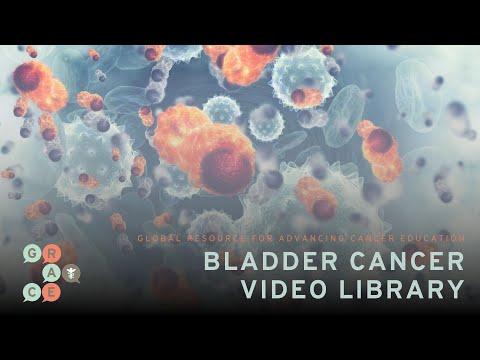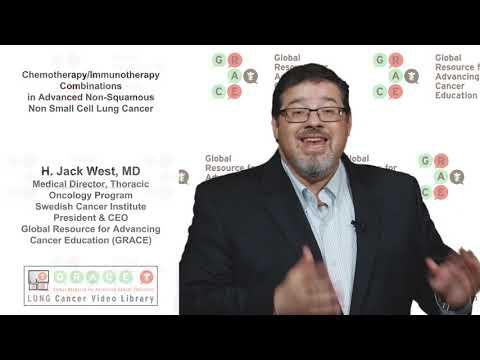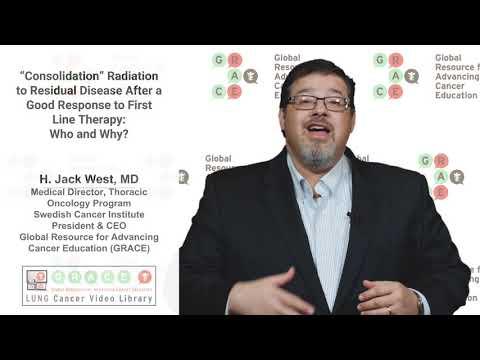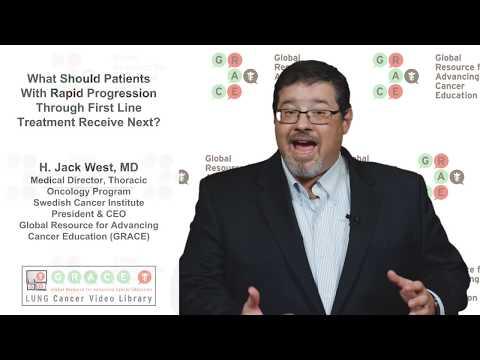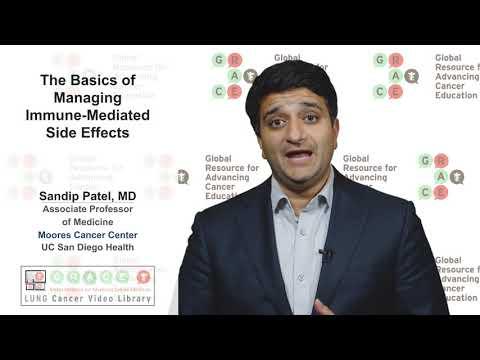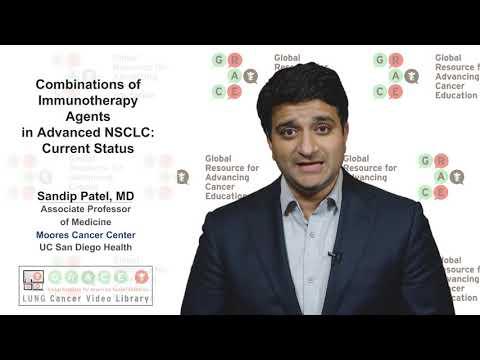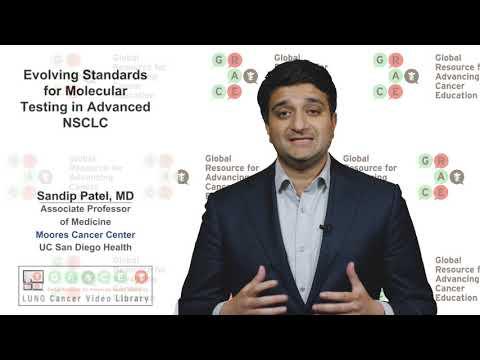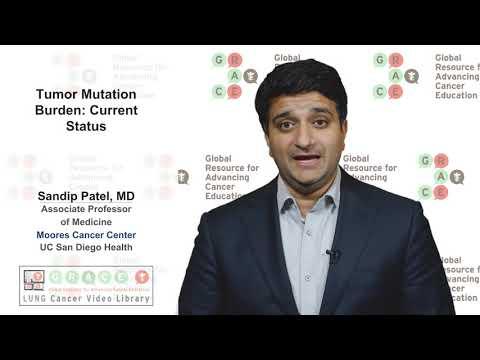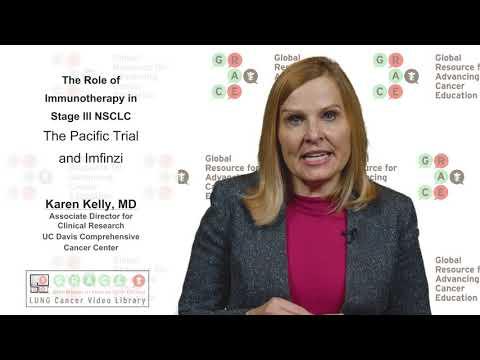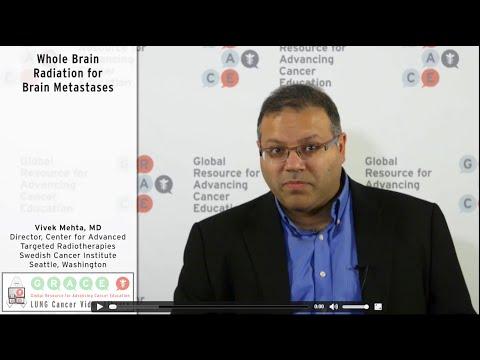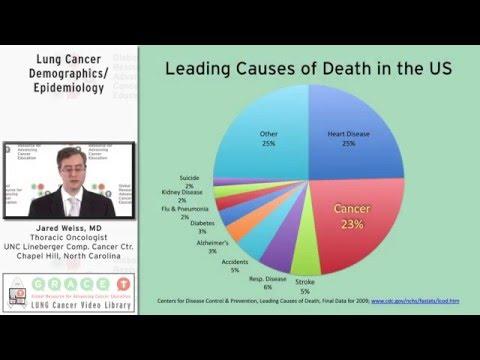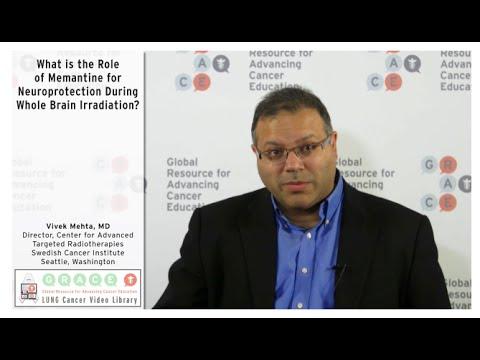We are excited to bring new and updated information to share through our Bladder Cancer Video Library. For this video series, we are pleased to work with Dr. Shilpa Gupta, Director of the Genitourinary Medical Oncology at TCI and Co-Leader of the Genitourinary Oncology Program at Cleveland Clinic
Video Library
Search the Video Library
Video Language
Filter by Cancer Type:
Displaying Results 46 - 60 of 174
Dr. H. Jack West, Medical Director, Thoracic Oncology Program, Swedish Cancer Institute, President and CEO of GRACE offers updates to our Lung Cancer Video Library. In this video, Dr. West discusses chemotherapy and immunotherapy combinations in advanced non-squamous non-small cell lung cancer. We
Dr. H. Jack West, Medical Director, Thoracic Oncology Program, Swedish Cancer Institute, President and CEO of GRACE offers updates to our Lung Cancer Video Library. In this video, Dr. West discusses "consolidation" radiation to residual disease after a good response to first-line therapy, who would
Dr. H. Jack West, Medical Director, Thoracic Oncology Program, Swedish Cancer Institute, President and CEO of GRACE offers updates to our Lung Cancer Video Library. In this video, Dr. West discusses patients with rapid progression through first-line treatment, and what they should receive next. We
Dr. Sandip Patel, Associate Professor of Medicine at the Moores Cancer Center, UC San Diego Health, joined GRACE to offer updates to our Lung Cancer Video Library. In this video, Dr. Patel discusses the basics of managing immune-mediated side effects. We thank the following organizations for their
Dr. Sandip Patel, Associate Professor of Medicine at the Moores Cancer Center, UC San Diego Health, joined GRACE to offer updates to our Lung Cancer Video Library. In this video, Dr. Patel discusses the current status of combinations of immunotherapy agents in advanced nsclc. We thank the following
Dr. Sandip Patel, Associate Professor of Medicine at the Moores Cancer Center, UC San Diego Health, joined GRACE to offer updates to our Lung Cancer Video Library. In this video, Dr. Patel discusses evolving standards for molecular testing in advanced NSCLC. We thank the following organizations for
Dr. Sandip Patel, Associate Professor of Medicine at the Moores Cancer Center, UC San Diego Health, joined GRACE to offer updates to our Lung Cancer Video Library. In this video, Dr. Patel discusses the current status of tumor mutation burden. We thank the following organizations for their support
Dr. Karen Kelly, Associate Director for Clinical Research at UC Davis Comprehensive Cancer Center, met with GRACE to bring updates to our Lung Cancer Video Library. In this video, Dr. Kelly discusses the role of immunotherapy in stage lll NSCLC, specifically the Pacific Trial and Imfinzi. We thank
Radiation Oncologist Dr. Vivek Mehta reviews the concept of using whole brain radiation for multiple brain metastases, including how it is delivered and risks and benefits of this strategy. Please feel free to offer comments and raise questions in our Discussion Forums. Transcript I see a number of
Radiation therapy can be very helpful in treating painful bone metastases or those at risk for causing a fracture due to compromise of bone strength. Dr. Vivek Mehta reviews the basics of this approach. Please feel free to offer comments and raise questions in our Discussion Forums. Transcript
Dr. Jared Weiss, UNC Lineberger Comprehensive Cancer Center, discusses the demographics and epidemiology of lung cancer.
What is the role for the neuroprotective agent memantine in patients receiving whole brain radiation therapy for brain metastases? Dr. Vivek Mehta reviews current practices to minimize risk of cognitive problems. Please feel free to offer comments and raise questions in our Discussion Forums
Interventional pulmonologist Dr. Jed Gorden reviews malignant pleural effusions (MPEs) are a common complication of lung cancer and some other cancers. Transcript So, I wanted to talk to you today about pleural effusions. Pleural effusions — it’s a complex term, and it’s a very common problem, so
Dr. Jed Gorden describes the details of how a thoracentesis is performed in order to clarify the diagnosis and treat symptoms of a malignant pleural effusion (MPE). Transcript With the pleural fluid that’s built up around the lung — this fluid that exist in between the linings, or as we discussed

